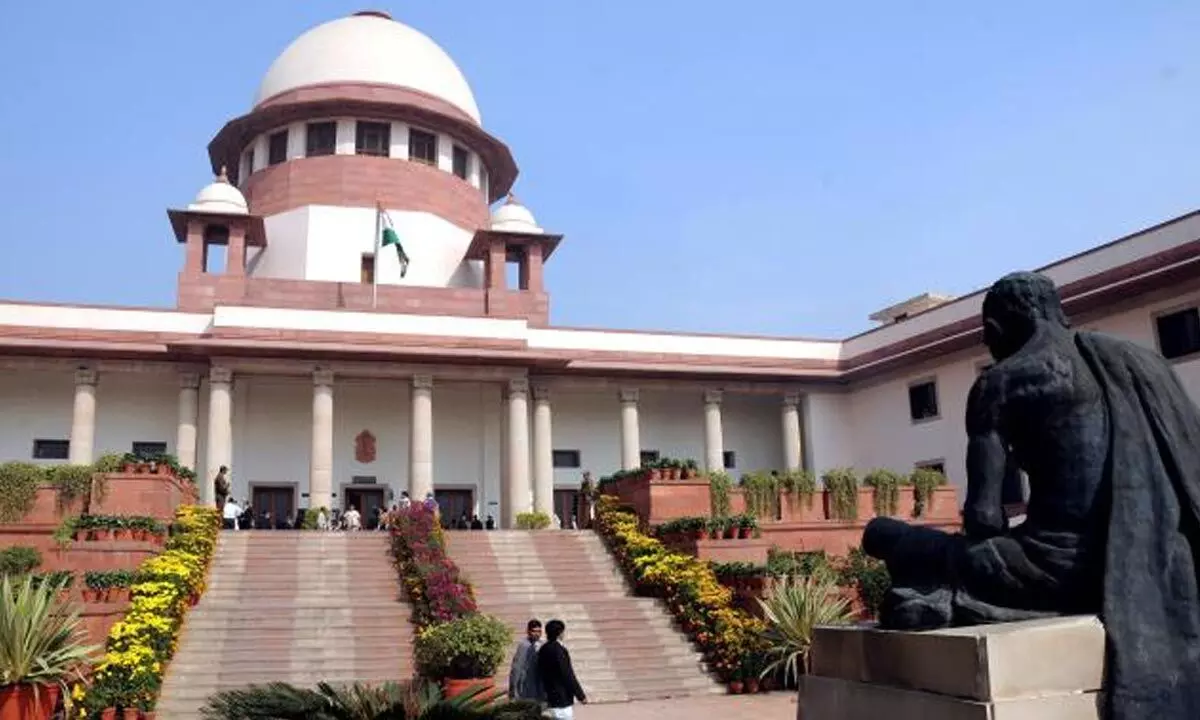Live
- Pokémon TCG Pocket to Introduce Card Trading in January 2025
- Nani unveils ‘MM 2’ title & first look
- Will challenge bail granted to actor Darshan in fan murder case in SC: Bengaluru Police Commissioner
- Chandrahass Launches Maruti Suzuki Dzire Through PJ Productions in Tolichowki Showroom
- Police case against farmers for tilling land claimed by Waqf Board in Karnataka
- Commendable move: Sandeep Dikshit on renaming Sarai Kale Khan ISBT chowk after Birsa Munda
- MahaYuti will come back to power with a thumping majority despite Oppn's tirade: Eknath Shinde
- ‘Hanging up my racquet. Thank you’ - India’s Prajnesh Gunneswaran retires from professional tennis
- Pawan Kalyan to Campaign for NDA Alliance in Maharashtra
- Eight killed, five injured in Nepal's traffic accident
Just In
Politicians don't enjoy higher immunity than common citizens: Supreme Court on CBI, ED misuse against Oppn

Supreme Court of India
The Supreme Court on Wednesday declined to entertain a petition jointly filed by 14 political parties comprising Congress, Trinamool Congress, AAP, NCP, Shiv Sena, alleging misuse of investigative agencies in arresting opposition leaders, and sought guidelines on arrest.
New Delhi: The Supreme Court on Wednesday declined to entertain a petition jointly filed by 14 political parties comprising Congress, Trinamool Congress, AAP, NCP, Shiv Sena, alleging misuse of investigative agencies in arresting opposition leaders, and sought guidelines on arrest.
A bench headed by Chief Justice of India and comprising Justice J.B. Pardiwala observed that political leaders do not enjoy an immunity higher than a common citizen and they are absolutely on the same footing as common citizens with no higher immunity, and questioned then how there can be no arrest unless triple test is satisfied? The political parties sought a fresh set of guidelines governing the arrest and remand.
Senior advocate Abhishek Manu Singhvi, representing the political parties, tried very hard to convince the court to change its mind and lay down guidelines of arrest of the leaders of Opposition political parties. However, the bench stressed that politicians are citizens and cannot enjoy any higher protection and the aggrieved individual politicians can approach court for appropriate remedy.
The bench told Singhvi that when political parties argue that there is a chilling effect on the Opposition due to CBI and ED cases against the leaders of the political parties, then the answer lies in the political space and not in courts.
The Chief Justice said general principles of law can't be laid down in absence of specific facts and added, "we can't lay down guidelines merely on the basis of some statistics relating to politicians".
After detailed hearing in the matter, Singhvi withdrew the petition, which was allowed by the bench.
The political parties sought guidelines to fulfil and realise the guarantee of personal liberty entrenched in Article 21 of the Constitution, for all citizens, including those targeted for exercising their right to political dissent and for performing their duties as the political opposition.
The political parties forming the petitioners are: Congress, DMK, RJD, BRS, Trinamool Congress, AAP, NCP, Shiv Sena (UBT), JMM, JD(U), CPI(M), CPI, Samajwadi Party, J&K National Conference, together representing 45.19 per cent of the votes cast in the last State/UT Assembly Elections, and 42.5 per cent of the votes cast in the 2019 General Elections, and holding power in 11 states/UTs.
The plea said that 14 Opposition political parties have filed a petition, in light of the alarming rise in the use of coercive criminal processes against the Opposition political leaders and other citizens exercising their fundamental right to dissent and disagree with the central government.
The plea submitted that investigating agencies such as CBI and ED are being increasingly deployed in a selective and targeted manner with a view to completely crush political dissent and upend the fundamental premises of a representative democracy. The petition has been drawn and filed by advocate Shadan Farasat.
"As for arrest and remand, the petitioners seek that the triple test (whether a person is a flight risk, or whether there is a reasonable apprehension of the tampering of evidence or of the influencing/intimidation of witnesses) be used by police officers/ED officials and courts alike for arrest of persons in any cognizable offences except those involving serious bodily violence. Where these conditions are not satisfied, alternatives like interrogation at fixed hours or at most house arrest be used to meet the demands of investigation," added the plea.

© 2024 Hyderabad Media House Limited/The Hans India. All rights reserved. Powered by hocalwire.com






